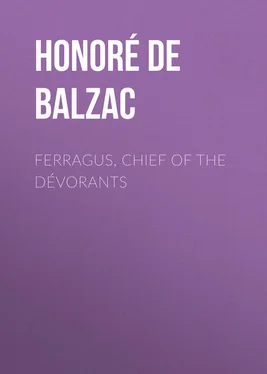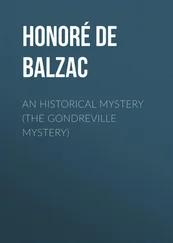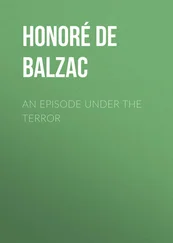Honoré Balzac - Ferragus, Chief of the Dévorants
Здесь есть возможность читать онлайн «Honoré Balzac - Ferragus, Chief of the Dévorants» — ознакомительный отрывок электронной книги совершенно бесплатно, а после прочтения отрывка купить полную версию. В некоторых случаях можно слушать аудио, скачать через торрент в формате fb2 и присутствует краткое содержание. Жанр: literature_19, foreign_antique, foreign_prose, на английском языке. Описание произведения, (предисловие) а так же отзывы посетителей доступны на портале библиотеки ЛибКат.
- Название:Ferragus, Chief of the Dévorants
- Автор:
- Жанр:
- Год:неизвестен
- ISBN:нет данных
- Рейтинг книги:5 / 5. Голосов: 1
-
Избранное:Добавить в избранное
- Отзывы:
-
Ваша оценка:
- 100
- 1
- 2
- 3
- 4
- 5
Ferragus, Chief of the Dévorants: краткое содержание, описание и аннотация
Предлагаем к чтению аннотацию, описание, краткое содержание или предисловие (зависит от того, что написал сам автор книги «Ferragus, Chief of the Dévorants»). Если вы не нашли необходимую информацию о книге — напишите в комментариях, мы постараемся отыскать её.
Ferragus, Chief of the Dévorants — читать онлайн ознакомительный отрывок
Ниже представлен текст книги, разбитый по страницам. Система сохранения места последней прочитанной страницы, позволяет с удобством читать онлайн бесплатно книгу «Ferragus, Chief of the Dévorants», без необходимости каждый раз заново искать на чём Вы остановились. Поставьте закладку, и сможете в любой момент перейти на страницу, на которой закончили чтение.
Интервал:
Закладка:
As for the Thirteen , they were all men of the stamp of Trelawney, Lord Byron’s friend, who was, they say, the original of his “Corsair.” They were all fatalists, men of nerve and poesy, weary of leading flat and empty lives, driven toward Asiatic enjoyments by forces all the more excessive because, long dormant, they awoke furious. One of them, after re-reading “Venice Preserved,” and admiring the sublime union of Pierre and Jaffier, began to reflect on the virtues shown by men who are outlawed by society, on the honesty of galley-slaves, the faithfulness of thieves among each other, the privileges of exorbitant power which such men know how to win by concentrating all ideas into a single will. He saw that Man is greater than men. He concluded that society ought to belong wholly to those distinguished beings who, to natural intelligence, acquired wisdom, and fortune, add a fanaticism hot enough to fuse into one casting these different forces. That done, their occult power, vast in action and in intensity, against which the social order would be helpless, would cast down all obstacles, blast all other wills, and give to each the devilish power of all. This world apart within the world, hostile to the world, admitting none of the world’s ideas, not recognizing any law, not submitting to any conscience but that of necessity, obedient to a devotion only, acting with every faculty for a single associate when one of their number asked for the assistance of all, – this life of filibusters in lemon kid gloves and cabriolets; this intimate union of superior beings, cold and sarcastic, smiling and cursing in the midst of a false and puerile society; this certainty of forcing all things to serve an end, of plotting a vengeance that could not fail of living in thirteen hearts; this happiness of nurturing a secret hatred in the face of men, and of being always in arms against this; this ability to withdraw to the sanctuary of self with one idea more than even the most remarkable of men could have, – this religion of pleasure and egotism cast so strong a spell over Thirteen men that they revived the society of Jesuits to the profit of the devil.
It was horrible and stupendous; but the compact was made, and it lasted precisely because it appeared to be so impossible.
There was, therefore, in Paris a brotherhood of Thirteen , who belonged to each other absolutely, but ignored themselves as absolutely before the world. At night they met, like conspirators, hiding no thought, disposing each and all of a common fortune, like that of the Old Man of the Mountain; having their feet in all salons, their hands in all money-boxes, and making all things serve their purpose or their fancy without scruple. No chief commanded them; no one member could arrogate to himself that power. The most eager passion, the most exacting circumstance, alone had the right to pass first. They were Thirteen unknown kings, – but true kings, more than ordinary kings and judges and executioners, – men who, having made themselves wings to roam through society from depth to height, disdained to be anything in the social sphere because they could be all. If the present writer ever learns the reasons of their abdication of this power, he will take occasion to tell them. 1 1 See Theophile Gautier’s account of the society of the “Cheval Rouge.” Memoir of Balzac. Roberts Brothers, Boston.
Now, with this brief explanation, he may be allowed to begin the tale of certain episodes in the history of the Thirteen , which have more particularly attracted him by the Parisian flavor of their details and the whimsicality of their contrasts.
CHAPTER I. MADAME JULES
Certain streets in Paris are as degraded as a man covered with infamy; also, there are noble streets, streets simply respectable, young streets on the morality of which the public has not yet formed an opinion; also cut-throat streets, streets older than the age of the oldest dowagers, estimable streets, streets always clean, streets always dirty, working, laboring, and mercantile streets. In short, the streets of Paris have every human quality, and impress us, by what we must call their physiognomy, with certain ideas against which we are defenceless. There are, for instance, streets of a bad neighborhood in which you could not be induced to live, and streets where you would willingly take up your abode. Some streets, like the rue Montmartre, have a charming head, and end in a fish’s tail. The rue de la Paix is a wide street, a fine street, yet it wakens none of those gracefully noble thoughts which come to an impressible mind in the middle of the rue Royale, and it certainly lacks the majesty which reigns in the Place Vendome.
If you walk the streets of the Ile Saint-Louis, do not seek the reason of the nervous sadness that lays hold upon you save in the solitude of the spot, the gloomy look of the houses, and the great deserted mansions. This island, the ghost of fermiers-generaux , is the Venice of Paris. The Place de la Bourse is voluble, busy, degraded; it is never fine except by moonlight at two in the morning. By day it is Paris epitomized; by night it is a dream of Greece. The rue Traversiere-Saint-Honore – is not that a villainous street? Look at the wretched little houses with two windows on a floor, where vice, crime, and misery abound. The narrow streets exposed to the north, where the sun never comes more than three or four times a year, are the cut-throat streets which murder with impunity; the authorities of the present day do not meddle with them; but in former times the Parliament might perhaps have summoned the lieutenant of police and reprimanded him for the state of things; and it would, at least, have issued some decree against such streets, as it once did against the wigs of the Chapter of Beauvais. And yet Monsieur Benoiston de Chateauneuf has proved that the mortality of these streets is double that of others! To sum up such theories by a single example: is not the rue Fromentin both murderous and profligate!
These observations, incomprehensible out of Paris, will doubtless be understood by musing men of thought and poesy and pleasure, who know, while rambling about Paris, how to harvest the mass of floating interests which may be gathered at all hours within her walls; to them Paris is the most delightful and varied of monsters: here, a pretty woman; farther on, a haggard pauper; here, new as the coinage of a new reign; there, in this corner, elegant as a fashionable woman. A monster, moreover, complete! Its garrets, as it were, a head full of knowledge and genius; its first storeys stomachs repleted; its shops, actual feet, where the busy ambulating crowds are moving. Ah! what an ever-active life the monster leads! Hardly has the last vibration of the last carriage coming from a ball ceased at its heart before its arms are moving at the barriers and it shakes itself slowly into motion. Doors open; turning on their hinges like the membrane of some huge lobster, invisibly manipulated by thirty thousand men or women, of whom each individual occupies a space of six square feet, but has a kitchen, a workshop, a bed, children, a garden, little light to see by, but must see all. Imperceptibly, the articulations begin to crack; motion communicates itself; the street speaks. By mid-day, all is alive; the chimneys smoke, the monster eats; then he roars, and his thousand paws begin to ramp. Splendid spectacle! But, O Paris! he who has not admired your gloomy passages, your gleams and flashes of light, your deep and silent cul-de-sacs , who has not listened to your murmurings between midnight and two in the morning, knows nothing as yet of your true poesy, nor of your broad and fantastic contrasts.
There are a few amateurs who never go their way heedlessly; who savor their Paris, so to speak; who know its physiognomy so well that they see every wart, and pimple, and redness. To others, Paris is always that monstrous marvel, that amazing assemblage of activities, of schemes, of thoughts; the city of a hundred thousand tales, the head of the universe. But to those few, Paris is sad or gay, ugly or beautiful, living or dead; to them Paris is a creature; every man, every fraction of a house is a lobe of the cellular tissue of that great courtesan whose head and heart and fantastic customs they know so well. These men are lovers of Paris; they lift their noses at such or such a corner of a street, certain that they can see the face of a clock; they tell a friend whose tobacco-pouch is empty, “Go down that passage and turn to the left; there’s a tobacconist next door to a confectioner, where there’s a pretty girl.” Rambling about Paris is, to these poets, a costly luxury. How can they help spending precious minutes before the dramas, disasters, faces, and picturesque events which meet us everywhere amid this heaving queen of cities, clothed in posters, – who has, nevertheless, not a single clean corner, so complying is she to the vices of the French nation! Who has not chanced to leave his home early in the morning, intending to go to some extremity of Paris, and found himself unable to get away from the centre of it by the dinner-hour? Such a man will know how to excuse this vagabondizing start upon our tale; which, however, we here sum up in an observation both useful and novel, as far as any observation can be novel in Paris, where there is nothing new, – not even the statue erected yesterday, on which some young gamin has already scribbled his name.
Читать дальшеИнтервал:
Закладка:
Похожие книги на «Ferragus, Chief of the Dévorants»
Представляем Вашему вниманию похожие книги на «Ferragus, Chief of the Dévorants» списком для выбора. Мы отобрали схожую по названию и смыслу литературу в надежде предоставить читателям больше вариантов отыскать новые, интересные, ещё непрочитанные произведения.
Обсуждение, отзывы о книге «Ferragus, Chief of the Dévorants» и просто собственные мнения читателей. Оставьте ваши комментарии, напишите, что Вы думаете о произведении, его смысле или главных героях. Укажите что конкретно понравилось, а что нет, и почему Вы так считаете.












